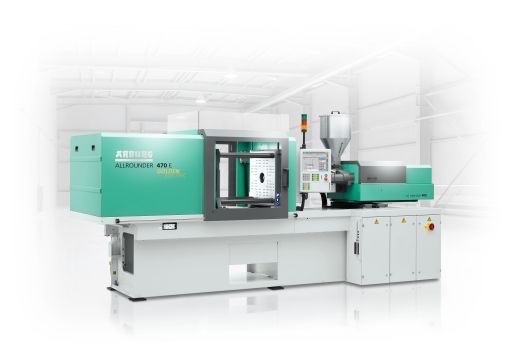Packaging
Allrounder 470 E Golden Electric: Flexible turnkey system produces dolphins from recyclate

Wednesday 22. November 2023 - Arburg will be present at Fakuma 2023 with nine exhibits on Stand 3101 in Hall A3, plus eleven additional machines on partner stands. A production cell built around an Allrounder 470 E Golden Electric will be producing small plastic dolphins fully automatically.
• Economical: Flexible turnkey system with Yaskawa
six-axis robot
• Efficient: Energy savings of around 70 per cent achievable with the electric Golden Electric series
• Sustainable: Processing of post-consumer recyclate (PCR) from old fishing nets
Arburg will be present at Fakuma 2023 with nine exhibits on Stand 3101 in Hall A3, plus eleven additional machines on partner stands. A production cell built around an Allrounder 470 E Golden Electric will be producing small plastic dolphins fully automatically. The material used will be a post-consumer recyclate (PCR) made from old fishing nets.
The flexible turnkey solution shows how a technically sophisticated process can be implemented efficiently and reliably. To achieve this, Arburg contributes its comprehensive expertise in injection moulding and automation and relies on cooperation with renowned partners.
Sophisticated injection moulding process
The electric injection moulding machine with a clamping force of 1,000 kN is equipped with a 1+1-cavity mould. In a cycle time of around 30 seconds, the two curved upper and lower shells of the dolphin are produced and removed by the six-axis robot. Welding the injection-moulded polyolefin parts using ultrasound and then pad printing them are also challenging tasks in terms of application technology. For the sophisticated 3D geometries, Arburg’s partner Herrmann Ultraschalltechnik has developed a special sonotrode contour. To ensure that both halves fit together exactly, it is essential to select the right gating point for reduced shrinkage and distortion, and to have a precise and reproducible injection moulding process. The next step is to give the dolphin a “face” in a multi-colour tampon printing system from partner ITW Morlock. The surface is pre-treated and activated beforehand using plasma from Plasmatreat so that the ink adheres well. The finished product is finally deposited on a conveyor belt.
New dolphin made from old fishing nets
The material processed is a post-consumer recyclate (PCR) based on high-density polyethylene (HDPE, Healix XHD-FN) obtained from used fishing nets. As a result, plastic waste is turned into a new, long-lasting product with a significantly improved carbon footprint. Arburg has a recyclate package and various pilot functions in its product range for the reliable processing of recyclates and generally batches in fluctuating material qualities. One innovation used for this application is “aXw Control RecyclatePilot”, which analyses the injection process without additional sensors in the mould, detects deviations from a previously stored reference and ensures consistent mould filling by means of adaptive control of the injection process.
Flexible automation with Yaskawa six-axis robot
Handling is performed by a Yaskawa six-axis robot integrated into the control system. Directly programmable via the machine controller or the associated Arburg manual control panel, the robot is as simple and quick to operate as a Multilift linear robotic system. The industrial robot “powered by Arburg” has been expanding the automation range since spring 2023. Arburg is assuming the role of system integrator here, offering coordinated production cells from a single source.
